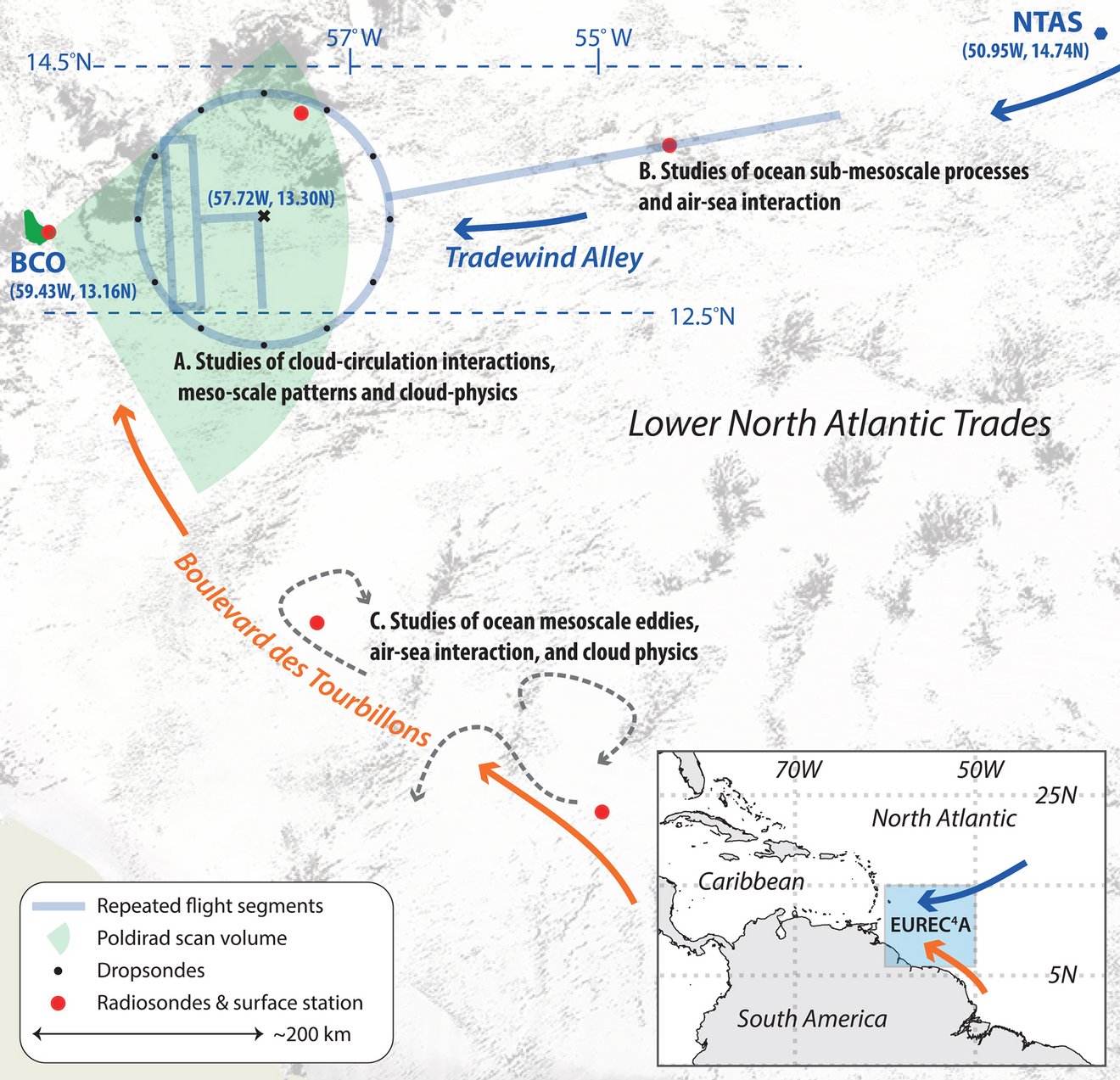Do clouds amplify global warming? EUREC4A field study tests hypothesized mechanisms

In presenting the EUREC4A measurements the authors demonstrate the successful application of new measurement techniques designed to test hypothesized mechanisms through which clouds would amplify global warming. The measurements lay the basis for better understanding how the spatial organization of shallow trade-wind clouds influences their ability to reflect sunlight or more effectively produce precipitation, how small scale eddies and ocean features influence the atmosphere above. They are also proving fundamental for the development of a new generation of storm-resolving global climate models and for testing concepts for future space-based observing systems.
From the point of view of theories of climate, 2 km to 200 km scale atmospheric and oceanic circulation systems are a form of dark matter. Both omnipresent and demonstrably impactful, these intermediate scales are not incorporated into our standard models of climate. Measurements from EUREC4A are the first to shine a light on the climatic role of these intermediate scale circulations, and are helping scientists to assess their role in crucial climate processes such as radiant energy transfer, ocean carbon uptake, as well as in mediating the effects of the human aerosol, or the distribution and intensity of precipitation.
The EUREC4A measurements were made possible through an international collaboration that enabled unprecedented sampling of the vertical structure of the atmosphere and ocean. This included 2500 balloon and parachute borne soundings of the atmosphere, and nearly 10,000 profiles of the ocean. These along with cloud properties, and particulate matter were performed by the continuous operation of four heavily instrumented research aircraft, four global-class research vessels, an advanced ground-based cloud observatory, and scores of autonomous or semi-autonomous observing platforms, many operated for the first time and heralding a new era in environmental sensing.
In addition to providing an outline of the novel measurements and their composition into a unified and coordinated campaign, EUREC4A supported a rich palette of outreach, capacity building, and knowledge transfer activities. These linked scientists from across the Caribbean to their counterparts throughout Europe and North America in an effort to better understand the processes that are pacing the rate of Earth’s warming, and the changes in weather patterns that this may entail.
About EUREC4A
EUREC4A, the world's largest measurement campaign to investigate the role of clouds in the climate system, began in early 2020. It took place on and off the Caribbean island of Barbados. More than 40 partner institutions were involved, four research aircraft and four research vessels were deployed, combined with ground measurement stations and satellite remote sensing.
Original publication:
Stevens, B., Bony, S., Farrell, U., et al. (2021) EUREC4A. Earth Syst. Sci. Data, 13, 4067–4119, https://essd.copernicus.org/articles/13/4067/2021/
More information:
Project website EUREC4A
EUREC4A Film
Contact:
Prof Dr Bjorn Stevens
Director
Max Planck Institute for Meteorology
Phone: +49 (0) 40 41173 422 (Assistant Angela Gruber)
Email: bjorn.stevens@mpimet.mpg.de
Dr Sandrine Bony
Directrice de Recherche CNRS
Laboratoire de Meteorologie Dynamique (LMD/IPSL)
Sorbonne Université
Phone: +33 1 44 27 50 14
Email: sandrine.bony@lmd.ipsl.fr
Dr David A. Farrell
Principal
The Caribbean Institute for Meteorology and Hydrology
Husbands, St. James, Barbados
Phone: 1-246-425-1362/63/67
Email: dfarrell@cimh.edu.bb
